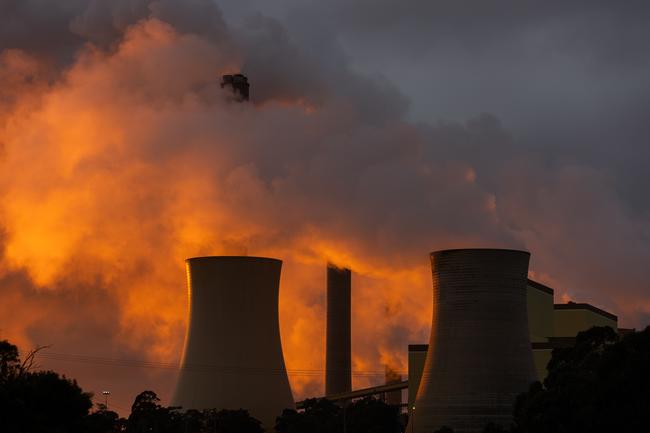Energy watchdog charges AGL as regulatory screw tightens on industry
The charge against AGL for failing to follow orders and deliver market stability is the latest enforcement action by the regulator amid mounting public anger.

Business
Don't miss out on the headlines from Business. Followed categories will be added to My News.
The Australian Energy Regulator has charged AGL Energy-owned entities with failing to stabilise the grid when ordered, the latest in a spate of enforcement actions amid heightened pressure to ensure the country’s power companies are confirming to market rules.
The AER said AGL Macquarie Pty (AGLM) and AGL Loy Yang Marketing (AGLL), the trading arms of two of the parent company’s coal power stations, offered to provide so-called frequency control ancillary services in response to market fluctuations, but when ordered by the country’s market operation – both did not deliver.
AGLM engaged in this conduct between September 2018 and August 2020 for two generating units at its Bayswater power station, and AGLL during periods between December 2019 and May 2020 for two generating units at its Loy Yang A power station, the AER said.
Loy Yang A and Bayswater are two of Australia’s largest generating coal power stations.
Under Australia’s market rules, electricity generators can offer to be on standby to provide market ancillary services to stabilise network frequency when there is a power system disturbance.
The AER said the failures threatened the security of Australia’s National Electricity Market. Both entities have admitted the breaches, the AER said, and will seek relief from the court.
Justin Oliver, AER board member, said it is important for generators to comply with their market ancillary services offers and dispatch instructions from the Australian Energy Market Operator (AEMO).
“Electricity generators must do what they say they will do if we are to keep the lights on through the market’s transition to variable renewable generation,” Mr Oliver said.
“When generators are not able to provide promised standby services, it creates a risk to power system security and stability. Generators receive payment from AEMO to be on standby to provide the FCAS services they have offered. We expect them to ensure that they provide those services when called upon,” Mr Oliver said.
AGL said the offences were unintended.
“At certain times over 2018 to 2020, units at the [Loy Yang A] and [Bayswater] power stations had an incorrect setting on the frequency influence switch at times when they had been enabled to provide contingency FCAS services. Those units consequently could not provide those services at those times,” a spokesman for AGL said.
“This was inadvertent. No profit was derived from this, and the funds initially received for the provision of the services were returned to AEMO following discovery of the issue.”
The AER action is the latest in a string of charges laid by the regulator in recent weeks. The AER is under heightened pressure to oversee the market amid mounting public anger towards energy companies as prices surge.
The AER in May approved price rises for most households and businesses of more than 20 per cent, the second such annual increase.
The increases have been fuelled by surging costs of generating electricity amid heightened global energy crunch triggered by Russia’s invasion of Ukraine.
Once major buyers of cheap gas from Russia were forced to seek alternative energy sources as the world sidelined Russia, pushing up prices for coal and gas, still the major sources of Australia’s electricity.
But the increases remain deeply unpopular as Australia grapples with soaring inflation and record pace of interest rate rises, prompting the government to urge regulators to keep a watchful eye on energy companies.
The AER has fined EnergyAustralia – the country’s third largest retailer – a record $400,000 for distorting the gas market earlier this month, while charges and fines have also been levied at Jemina and Incitec Pivot.
Originally published as Energy watchdog charges AGL as regulatory screw tightens on industry



